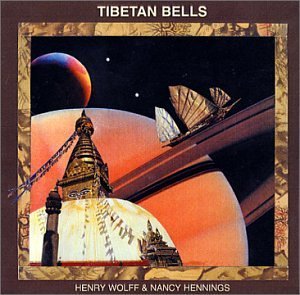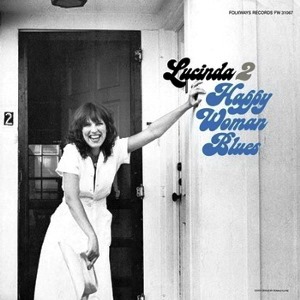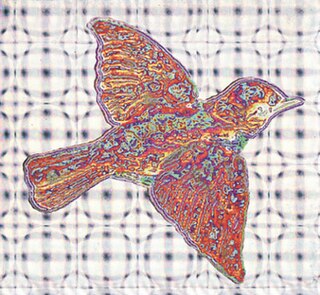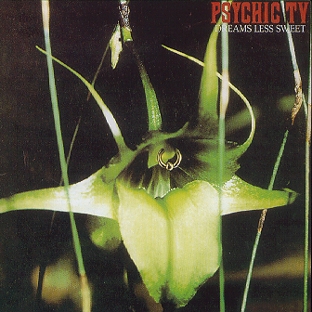
Mickey Hart is an American percussionist. He is best known as one of the two drummers of the rock band Grateful Dead. He was a member of the Grateful Dead from September 1967 until February 1971, and again from October 1974 until their final show in July 1995. He and fellow Dead drummer Bill Kreutzmann earned the nickname "the rhythm devils".

Tibetan Bells is a 1972 album by Henry Wolff and Nancy Hennings. It was the first recording to use Tibetan bells and singing bowls, and helped establish some of the fundamentals of new-age music.

Ain't Life Grand is the fourth studio album by the Athens, GA-based band Widespread Panic. It was released by Capricorn Records and Warner Bros. Records on September 6, 1994. It was re-released in 2001 by Zomba Music Group. On July 3, 2014, the band announced that Ain't Life Grand would be reissued on vinyl in August 2014.

A standing bell or resting bell is an inverted bell, supported from below with the rim uppermost. Such bells are normally bowl-shaped, and exist in a wide range of sizes, from a few centimetres to a metre in diameter. They are often played by striking, but some—known as singing bowls—may also be played by rotating a mallet around the outside rim to produce a sustained musical note.

Changes is the ninth studio album by the Monkees. The album was issued after Michael Nesmith's exit from the band, leaving only Micky Dolenz and Davy Jones to fulfill the recording contract they had signed in the mid-1960s. Changes was their last new album for Colgems Records and the group's last album of all new material until Pool It!, released in 1987.

Happy Woman Blues is the second studio album by American singer-songwriter Lucinda Williams, released in 1980, by Smithsonian Folkways.

Space Wrangler is the first studio album by the Athens, GA based band Widespread Panic. It was first released by a small Atlanta label, Landslide Records, on February 4, 1988. It was later reissued four times, the first two times by Capricorn Records/Warner Bros. Records, and, in 2001, by Zomba Music Group. Space Wrangler was reissued for the fourth time on vinyl for one day — July 15, 2014 — as a special reissue through Think Indie distribution, that was sold only at independent record stores.

Everyday is the third studio album by the Athens, GA based band Widespread Panic. It was first released by Capricorn Records and Warner Bros. Records on March 3, 1993. It would later be re-released in 2001 by Zomba Music Group. On July 3, 2014 the band announced that Everyday would be reissued on Vinyl in August, 2014. The reissue will be distributed via ThinkIndie distribution and sold only at participating independent record stores.

Bombs & Butterflies is the fifth studio album by the Athens, Georgia-based band Widespread Panic. The band started recording the album in July 1996 at John Keane's studio in Athens. The band held a CD release party at Morton Theatre in Athens, one day prior to their Fox Theatre New Year's Eve run on December 28, 1996. It was first released by Capricorn Records on February 4, 1997. It would later be re-released in 2001 by Zomba Music Group.

'Til the Medicine Takes is the sixth studio by the Athens, GA-based band Widespread Panic. The album's name refers to a line in the chorus of the fourth track, "Blue Indian". It was released by Capricorn Records on July 27, 1999. It was re-released in 2001 by Zomba Music Group.
Nancy Hennings is an American musician who teamed up with Henry Wolff to make the album Tibetan Bells in 1971, one of the pioneering LPs of new-age music. In 1982, with the assistance of Wolff and Grateful Dead drummer Mickey Hart, she produced the mysterious sounding Yamantaka. She also contributed to the other Tibetan Bells albums Tibetan Bells II, Tibetan Bells III and The Bells of Sha'ng Shu'ng.

GyutoTantric University is one of the great monastic institutions of the Gelug Order.

Dreams Less Sweet is the second studio album by English experimental band Psychic TV, released in 1983. It was the last Psychic TV album to feature co-founder Peter "Sleazy" Christopherson.

Cool Struttin' is an album by jazz pianist Sonny Clark that was released by Blue Note Records in August 1958. Described as an "enduring hard-bop classic" by The New York Times, the album features alto saxophonist Jackie McLean, trumpeter Art Farmer and two members of the Miles Davis Quintet, drummer Philly Joe Jones and bassist Paul Chambers. According to The Stereo Times, the album enjoys "a nearly cult status among hardcore jazz followers", a reputation AllMusic asserts it deserves "for its soul appeal alone".

Alone is an album by jazz musician Bill Evans, recorded in late-1968 for Verve Records.

Brian Keane is a multi Emmy and Grammy award-winning American composer, music producer, and guitarist. Keane has been described as "a musician's musician, a composer's composer, and one of the most talented producers of a generation" by Billboard magazine.
Tibetan bell may refer to:

The Best of Mickey Hart: Over the Edge and Back is a retrospective album by Mickey Hart. It was released by Rykodisc Records on April 23, 2002, in two formats — CD, and DVD-Audio. It contains music excerpted from six of Hart's albums – Diga (1976), The Apocalypse Now Sessions (1980), At the Edge (1990), Planet Drum (1991), Mickey Hart's Mystery Box (1996), and Supralingua (1998). It also contains one previously unreleased track.

Mickey Hart's Mystery Box is an album by former Grateful Dead drummer Mickey Hart. It was released on CD and cassette by Rykodisc Records on June 11, 1996. The album combines Hart's percussion-based world music with the vocal harmonies of the British singing sextet the Mint Juleps. Robert Hunter wrote the lyrics for all the songs.

Däfos is a live album by percussionists Mickey Hart and Airto Moreira and vocalist Flora Purim. It was recorded at the Japan Center Theatre in San Francisco, California, in 1982 and 1983, and was initially released in 1983 by Reference Recordings. It was later reissued by Rykodisc as part of their series titled "The World", and is included in the Smithsonian Folkways Mickey Hart Collection. The reissue includes a bonus track that was recorded in 1984 at Fantasy Studios in Berkeley, California.


















